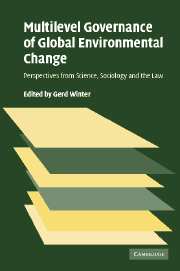 Multilevel Governance of Global Environmental Change
Multilevel Governance of Global Environmental Change Book contents
- Frontmatter
- PREFACE
- Contents
- List of figures
- List of tables
- Notes on contributors
- List of abbreviations
- 1 Introduction
- PART I Earth system analysis
- PART II Society and institutions of global; environmental change
- PART III Self-regulation of industry and the law
- PART IV The potential of the state
- 9 The diffusion of environmental policy innovations
- 10 Process-related measures and global environmental governance
- 11 The impact of the USA on regime formation and implementation
- 12 Transnational bureaucracy networks: a resource of global environmental governance?
- PART V The potential of world regions
- PART VI Formation and implementation of international regimes
- PART VII Improving the instruments of global governance
- PART VIII Fundamental concepts of institutionalising common concern
- Index
11 - The impact of the USA on regime formation and implementation
Published online by Cambridge University Press: 04 May 2010
- Frontmatter
- PREFACE
- Contents
- List of figures
- List of tables
- Notes on contributors
- List of abbreviations
- 1 Introduction
- PART I Earth system analysis
- PART II Society and institutions of global; environmental change
- PART III Self-regulation of industry and the law
- PART IV The potential of the state
- 9 The diffusion of environmental policy innovations
- 10 Process-related measures and global environmental governance
- 11 The impact of the USA on regime formation and implementation
- 12 Transnational bureaucracy networks: a resource of global environmental governance?
- PART V The potential of world regions
- PART VI Formation and implementation of international regimes
- PART VII Improving the instruments of global governance
- PART VIII Fundamental concepts of institutionalising common concern
- Index
Summary
The US attitude towards international regimes in general
Isolationism, unilateralism, and multilateralism as ever competing trends in US foreign policy-making
Three general approaches to foreign policy have struggled to gain control over the US decision-making process in the past: isolationism, unilateralism, and multilateralism. Each of these approaches has prevailed at one time or another but never dominated this process unchallenged. Foreign policy decisions are therefore usually based on a compromise which includes elements of all three of these trends to a varying degree. The fact that the President and Congress represent a variety of different opinions with regard to the formulation of foreign policy goals, and the fact that the President as well as Congress is involved in the formulation of policy goals, guarantees the inclusion of the three approaches mentioned in the decision-making process. Usually, the President will lean towards either unilateralism or multilateralism, while Congress will introduce a counter-balance of either multilateralism or unilateralism, and also an element of isolationism. This applies to international regimes of any kind, not only to environmental law, but conflicts between the President and Congress have prevented the USA from ratifying major international environmental agreements. One example is the Basle Convention on the Control of Transboundary Movements of Hazardous Wastes and their Disposal.
- Type
- Chapter
- Information
- Multilevel Governance of Global Environmental ChangePerspectives from Science, Sociology and the Law, pp. 275 - 304Publisher: Cambridge University PressPrint publication year: 2006


